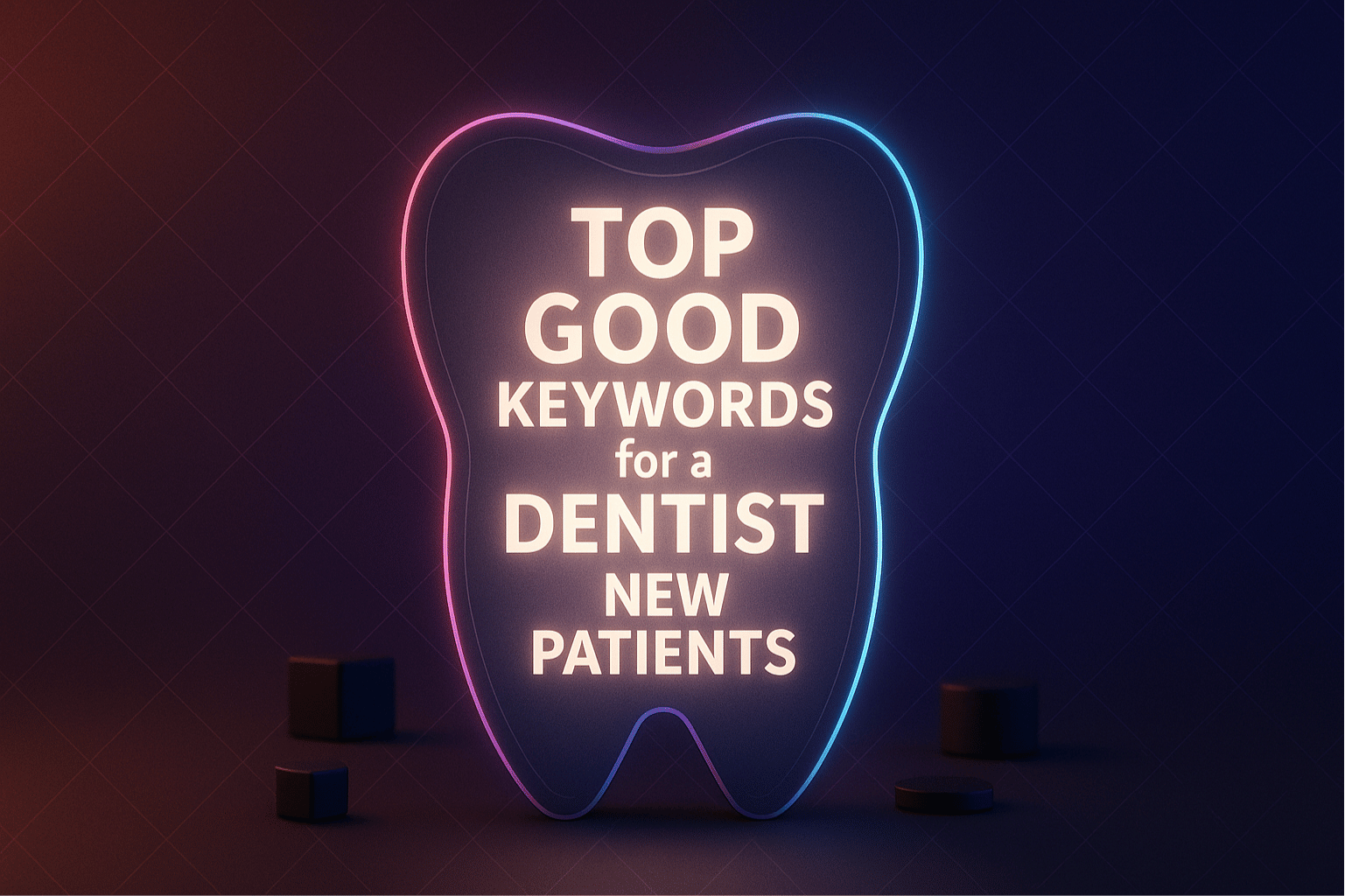Finding good keywords for a dentist is essential to growing your patient base and improving your online visibility in 2025. By understanding what terms people use when searching for dental services, your practice can craft a smarter, more effective local SEO strategy. In this guide, we’ll walk through how to choose and use dental keywords that convert.

Check our last article:
Why Choosing Good Keywords for a Dentist Matters
Ranking well on Google starts by choosing smart language. For your dental practice, that means selecting good keywords that reflect what real patients are typing into search engines.
Patients don’t randomly browse—they type with intent. If your site isn’t showing up for high-value queries, you’re not just invisible… you’re missing out on appointments.
The Role of SEO in Patient Acquisition
These days, effective dental marketing hinges on visibility in local search results. Search engine optimization (SEO) connects your services with patients who are ready to take action.
• 75% of users never scroll past page one of Google ⚠️
• Pages that rank top receive significantly more clicks
• Good keywords bring in traffic—without needing a paid ad budget
Impact of High-Intent Keywords on Conversion
Not every website visitor is a potential patient. Someone searching “emergency tooth extraction” likely needs help today, not six months from now.
• “Emergency tooth extraction” signals urgent need
• “Teeth cleaning near me” shows they’re ready to book
• “Dental implant specialist” targets patients with complex issues
These are the search terms that move real people to real appointments.
Types of Keywords Dentists Should Target in 2025

Service-Based Keywords (e.g., teeth whitening dentist)
Patients often search by procedure. You want to appear for terms tied to dental services people actively seek out.
• Cosmetic dentistry options
• Dental hygiene visits
• Toothache relief services
• Invisalign clear aligners
These help match people’s dental goals with your specific solutions.
Location-Based Keywords (e.g., dentist near me)
Most patients want a dental office nearby. Google knows this, and prioritizes local relevance.
• Include your city or neighborhood
• Add nearby suburbs or landmarks
• Use phrases like “open now” or “walk-in clinic” ✅
Geo-targeted keywords land your practice on the maps—and in more appointments.
How to Identify the Best Dental Keywords for Your Practice
Using Keyword Research Tools Effectively
Tools like Ubersuggest or Google Keyword Planner can quickly highlight the most relevant and achievable keywords.
• Look for high-search, low-competition keywords
• Prioritize searches with action-based language
• Check what questions patients are asking about oral care
Analyzing Competitor Keyword Strategies
Don’t just guess—see what’s working for other nearby clinics, then build a better version.
• Review their homepage language and meta titles
• Scan their blog post topics and service pages
• Identify overused or repeated keyword phrases ⚠️
Find where they're succeeding—and the gaps you can fill.
Optimizing Your Dental Website for Chosen Keywords
Best Practices for On-Page SEO
Once you've found your good keywords, it’s all about placement—not repetition.
• Use them in H1, H2s, and meta descriptions
• Add them to image alt text and filenames
• Include them in the first 100 words of each page
Where to Place Your Keywords Strategically
Placement isn’t just about rankings—it also improves patient clarity and confidence.
• Use keywords in your homepage headline and opening paragraph
• Add them naturally into service pages like “tooth extraction” or “teeth whitening”
• Feature them in your FAQ and testimonial sections ✅
Most of your traffic will come from 10–15 high-performing search terms.
A tip from experience? Assign one specific, high-intent query to each main page—don’t split focus.
Leveraging Long-Tail Keywords to Attract Specific Patients
Examples of Long-Tail Dental Keywords
Longer, more specific keyword phrases bring in committed patients searching for a match.
• “Same-day dentures in Austin”
• “Kids’ dentist accepting Medicaid”
• “How to stop gum bleeding fast”
Lower search volume? Yes. Better leads? Absolutely.
Why Long-Tail Keywords Convert Better
Users who search detailed dental phrases are:
• Closer to making a decision
• Actively managing a condition
• Looking for an exact dental treatment fit
Common Keyword Mistakes Dentists Should Avoid
Overstuffing Keywords Undermines SEO
Google and your readers aren’t fans of keyword spam. Resist the “more is better” trap.
• Keyword stuffing can lead to search penalties ⚠️
• Text that’s hard to read drives patients away
• Write naturally, then edit to align with your goals
Avoiding Broad or Irrelevant Terms
Avoid generic keywords like “dentist” if you want to stand a chance in local search.
• Competing against national chains is draining
• You’ll attract the wrong visitors—not action-takers
• Focus instead on geo- and procedure-based queries
Tracking & Improving Your Keyword Performance Over Time

Monitoring Rankings and Traffic with Analytics
Free tools like Google Analytics and Search Console let you observe what’s working over time.
• Check performance for each oral care service page
• Monitor high-bounce keywords
• Track upward or downward ranking trends
Iterating Your Keyword Strategy Quarterly
Every quarter, audit your keyword plan. Freshen it up to stay competitive.
• Delete underperforming search terms
• Add new service- or symptom-based keywords
• Target seasonal searches like “school dental checkups”
Pro tip: Try updating your Google Business title with one proven keyword—it often boosts maps visibility within days.
Using Good Keywords for a Dentist in Content Marketing
Blog Topic Ideas Based on Dental Keywords
Blog content is a great way to rank for lower-volume, high-conversion terms patients are asking about.
• What to expect during wisdom teeth removal
• How long does teeth whitening last?
• Best options for missing teeth ✅
Answer patient questions before they ever pick up the phone.
Creating Local SEO Content That Ranks
Your content should tie treatment keywords with geographic relevance to drive new traffic.
• Try terms like “cosmetic dentistry in Denver” or “Invisalign near Downtown LA”
• Feature community events relevant to the dental world
• Create pages for accepted insurance plans or financing
Helpful, localized content builds trust—and gets clicks.
Check our next article: Maximize Patient Leads with Dental Call Tracking
Start attracting more local patients today by optimizing your site with high-converting dental keywords!
Good keywords for a dentist
How do I find seasonal good keywords for a dentist?
Should dentists use keywords for insurance and financing?
Are voice search keywords important for dentists in 2025?
Can negative keywords help dentists improve ad spend?

.svg)


.svg)
